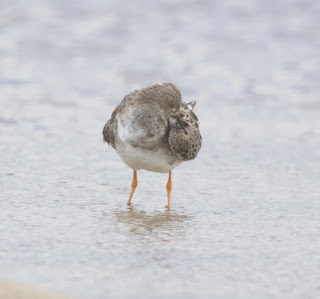Sunday, 6 February 2022
No Ruff Too Tough
The Ruff is a rare visitor to eastern Australia. Although I’ve seen quite a few in Australia, especially when I lived in Perth, I’d not yet photographed the species in this country. So when one was found by Peter Spradbrow at Flat Rock, Ballina, on 23 November, 2021, I was interested to see if it hung around. The Ruff wasn’t seen again until 31 December when it was located by Steve McBride associating with Great Knots and others at a shorebird high tide roost at South Ballina, on the beach a short way south of the Richmond River mouth. Ruff usually occurs in Australia in wetlands or saltmarshes, so these marine environs were atypical habitat. The bird roosted regularly at the site until 17 January, 2022. I headed down to Ballina that day but didn’t get to look until the next morning. No Ruff was present, then or the next day.
Meanwhile, it emerged later that the Ruff turned up on sandflats in North Creek, adjoining The Serpentine – north of the Richmond River - at low tide on January 16. It was found on other dates at this site up until January 26. On February 2, the bird was back roosting at South Ballina. It is not far between these two areas (a bit over 1km as the Ruff flies) but sometimes flooded roads and a vehicular ferry have to be negotiated to make the river crossing. I headed down to Ballina for the second time on February 4. The weather was atrocious with continuous gale-force winds and driving rain. On this and the following day, beach conditions at South Ballina were impossibly difficult, with a giant swell inundating the roost area even at lowish tides. Three Beach Stone-Curlews (below) at the carpark at the end of South Ballina Road were pleasing.
The small number of shorebirds present included Eastern Curlew (above), Sanderling, Red-necked Stint and Ruddy Turnstone (3 species together below, followed by Sanderling).
A beachwashed Flesh-footed Shearwater was found.
Local birder Hans Wolmuth meanwhile was lending a hand, checking out spots north of the river. Hans had no joy in the morning and we both looked unsuccessfully around North Creek in the late-afternoon. Still, the Little Terns were entertaining.
Finally, at 6.30am this morning at low tide, I found the bird on sand flats close to The Serpentine. Conditions were still difficult with gusty winds and heavy rain. The Ruff was variously feeding, bathing and preening. It again was associating with Great Knots (first image below; all Ruff images in this post were taken today) and appeared to be quite relaxed for a short while before it and the knots flew off in a southerly direction. Hans found them 3.5 hours later on a nearby sand bar, and saw the birds fly back to where I located them early in the morning. Late that afternoon, Nathan Ruser saw the bird not far from where I'd picked it up in the morning, showing it was frequenting these sandflats on either side of high tide. Still, the birds' local movements remain something of a mystery. What we do know is that it has been in the Ballina area for about 10 weeks - an unusually long time for this vagrant.
A rainbow crowned off an excellent morning.
A visit to nearby Flat Rock was less energising with the rock covered in a layer of metre-high sea foam.
On the way back a brief spot at Wadegos Bach, Byron Bay, turned up a Wandering Tattler (below) and large numbers of Wedge-tailed Shearwaters close inshore.













